Zebra
Buy Zebra The rock trio Zebra existed with almost equal measures of three critical stripes – love, hate and indifference. The group’s dedicated fans point out the melodic dynamics present with group leader […]

Buy Zebra The rock trio Zebra existed with almost equal measures of three critical stripes – love, hate and indifference. The group’s dedicated fans point out the melodic dynamics present with group leader […]

The three-piece rock band Zebra did not spend a long time on the national scene, nor did they have tremendous success while they were on that scene. But there is no doubt that […]